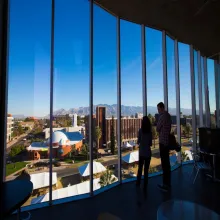
We are hiring!
We are looking for curious, creative and talented people with various skills and interests. We are a highly interdisciplinary, collaborative, and well-funded lab focusing on the understanding and engineering of multicell systems. Particular applications include:
- Synthetic developmental programs
- Understanding the transition(s) to multicellular life
- Novel Biomaterials
- Understanding biofilm ecology and emergence of antibiotic resistance
- Synthetic microbial consortia for drug synthesis, bioremediation, and greenhouse gas reduction
The University of Arizona, Tucson, Arizona, and the South-West are exciting and affordable places to work, live, and explore!
Postdocs
We have multiple openings for postdocs with a strong background and interest in one or more of the following areas: bioengineering, synthetic biology, microbiology, metabolic engineering, bacteriology, developmental biology, biochemistry, physics, mechanical engineering, material sciences, applied mathematics, computer science, or related.
Research projects focus on synthetic biology as well as biophysics of multicell systems. Specific projects will be developed based mutual interest of the candidate and the PI. For example, we recently developed the first synthetic and optogenetic tools to control cell-cell and cell-surface adhesion in e.coli to then engineer multicellular patterns and materials (Kim Nature 2022, Glass Cell 2018, Jin PNAS 2018). One project goal is to now engineer and study multicell forms and patterns while expanding our synthetic biology toolbox, e.g., implementing "synthetic developmental biology programs." Another project focuses on the engineering of enzymes / microbial consortia / bioreactors that can convert methane into value chemicals. A third project goal is to understand the underlying dynamic and biophysical principles of bacterial aggregation and ecology.
Projects can be experimental, computational, or both. The ideal candidate has experience in one or more of the following: Genetic engineering, synthetic biology, microbiology, imaging, microfluidics /instrumentation, theory / modeling.
Email your application directly to ingmar@arizona.edu (include cover letter and CV).
See job add here.
Staff scientists
The primary purpose of this appointment is to conduct research – independently as well as in collaboration with other lab members. The successful candidate will develop and troubleshoot new assays as needed, analyze data, prepare publication quality figures and keep meticulous records. The position also includes training of new lab members, organizing the lab (maintaining stocks, making solutions, organizing lab inventories), presenting research results (lab meetings, conferences), and assisting with grant and progress report writing.
The ideal applicant is well trained and has extensive experience in one or more of: Molecular biology (DNA cloning, PCR, RNA isolation), biochemistry (protein analysis, western plotting, immunostaining), cellular biology, microbiology (especially handling bacteria), and fluorescence microscopy. Experience with microfluidics and computational approaches are an additional plus.
Email your application directly to ingmar@arizona.edu (include cover letter and CV).
See job add here.
Graduate students / rotation students
We have multiple openings for graduate and rotation students. Our lab provides many opportunities for interdisciplinary training and stimulating collaborations.
Email your application directly to ingmar@arizona.edu (include cover letter, CV, and transcript).
For relevant project ideas and desired background - see postdoc section above.
Undergraduate students
Highly motivated undergraduates from various backgrounds are very welcome to contact us about research opportunities. For relevant project ideas and desired background - see postdoc section above.
Email your application directly to ingmar@arizona.edu (include cover letter, CV, and transcript).
FUNDING
Our lab has been supported by various sources over the years. Currently significant funding is provided by:
NSF 2229070: FMRG - Distributed methane conversion into value chemicals via synthetic microbial consortia
NIH 1R01GM145893: From synthetic bacterial adhesions to synthetic bacterial materials
NSF 2214020: Foundations of programmable living materials through synthetic biofilm engineering and quantitative computational modeling

